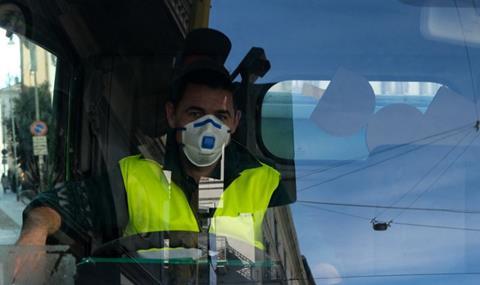
The industry has begun making plans to mitigate the effects of Covid-19, but hauliers have told motortransport.co.uk they also need the government to provide more regular updates on the spread of the virus.
As UK health officials moved into the second phase of their response to the coronavirus outbreak, companies involved in logistics and distribution said the burden of responsibility to keep supermarkets and shops fully stocked was “huge”.
Peter Whitehead, MD at PF Whitehead in Croydon, said it had significant warehousing in London delivering anything from food to medical supplies into the capital on a just-in-time-basis and so “a pandemic is something you just can’t prepare for”.
He said: “For now, we are giving all our staff their own antibacterial cleaning materials, the options of breathing masks and encouragement to keep delivery client contact to an absolute minimum.
“On site we have locked down the traffic office and are encouraging drivers to take breaks in their cabs rather than mixed canteen areas.
“It has to be a common sense approach,” he added.
“Monitoring staff health and previous travel is all taken into account.
“We have great agency back up plus many of my management team including myself have our HGV licences, so we’ll keep finding a way.”
Robert Wilcox, MD at Massey Wilcox, said it was difficult to say if Covid-19 had already affected the company directly, “other than to bring down the cost of fuel for a short time'.
He said: “We can only plan when we know what we are planning for.
“If there is to be an epidemic in the UK - and they are saying this could be three, four or more weeks away - then we need to know the hotspots and find ways to handle those.
“It doesn’t help when the government has made the statement that we will get weekly updates of the spread of the virus.
“A week is a long time in epidemics!”
One Surrey-based haulier that subcontracts international work told Motor Transport he’d heard of hauliers refusing to travel to Italy after it became the European centre of the virus outbreak.
He added that his company was playing it by ear but for now, it was “business as usual.”
Transport law firm Backhouse Jones said practical steps haulage companies could take included providing staff with masks, sanitizer and hand gel.
In an update for hauliers, the solicitors said: “Over the last few weeks we have become increasingly aware of operators in the transport sector being informed by their customers or contractors that there is no work for them for the foreseeable future.
“This is usually where links to overseas deliveries are in the supply chain or driving overseas is concerned.
“Some operators have noticed a decline in the amount of work while others have been ground to a dramatic and rather immediate halt, particularly within the container shipping and freight community.
“This inevitably has a knock-on effect however.”
Backhouse Jones advised companies to check contracts of employment to see if there is an express right to ‘lay off’ staff or place them on short time working.
Alternatively, firms can seek to agree a proportionate reduction in pay and working hours following consultation with staff.
But away from contractual agreements and staff pay, Whitehead summed up a feeling widespread in haulage even before the spread of the new coronavirus: “Transport is largely unnoticed and undervalued until the shelves dry up,” he said.
“We feel a huge responsibility to keep the wheels turning.”










